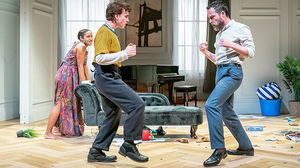Review: THE SON, Duke Of York's Theatre

![]()
After an astonishing success at the Kiln Theatre earlier in the year, Florian Zeller's The Son (in a translation by Christopher Hampton) transfers to the West End. Director Michael Longhurst has the entire cast reprising their roles, with John Light and Amanda Abbington playing the parents of Laurie Kynaston's Nicolas once again.
The jarring exploration of teenage depression is tighter and even more poignant in this second incarnation, having filled in those small gaps that kept the ending too anchored to the ground the first time. They are assured in their gut-wrenching pace, with Light delivering what could be the performance of a lifetime.
Pierre, a lawyer with his eyes on politics in modern-day Paris, is a poised and eloquent man. Neither he nor his ex-wife Anne pick up the red flags Nicolas keep showing, choosing to be critical of his behaviour instead of realising he needs help. The outer pressure they put on their son after an ugly divorce pushes their child to alienate himself and slowly make him lose his grip on his own life.
They inadvertently cause him to feel like a stranger in his parents' lives: Pierre and his new partner Sophie try to make space for him in their home while his mother Anne struggles with her feeling threatened by her son's attitude. Nicolas bounces back and forth between the two households, failing to find a balance and worsening the state of his mental health.
Zeller builds his characters with meticulous detail: from their emotional sphere to the unintentional harm they're doing to Nicolas, they are true to form humans. Longhurst takes them and carefully moves them around Lizzie Clachan's beautiful set design, toying with Zeller/Hampton's natural written rhythm and presenting a heart-shattering piece of theatre.
The stillness he creates after the clashes is overwhelming and the stunned silences followed by broken words and muffled cries become deafening after the silly dances and bright laughs shared by the family. The scenes bleed into one another with the characters loitering around the stage longer than it's textually necessary, heightening the dramatic impact of their presence.
They're as oblivious to the destruction and mess that surround them physically as they are to Nicolas's true needs. The guilt and despair they feel as they can't seem to help grow into outbursts of frustration towards each other and him while they all wrestle with the lack of terms to describe what's happening.
The company Longhurst's assembled work together like pieces of a puzzle to create the disconcerting picture. The imagery he uses is vivid in its symbolism, from the mounted deer head abandoned on the floor to the alarming writing on the walls. He unlocks Light's performance spectacularly, leading him onto an intricate journey of self-discovery and devastation.
Light plays with his mannerism and stance, clicking his character into his "work mode" and speaking harangues whenever his beliefs are challenged or when he subtly perceives he doesn't understand something. Kynaston has refined his characterisation of Nicolas, who's seemingly more self-assured and open about his feelings. His attempts to communicate what's going on with him are shut down again and again, turning him into a pressure cooker ready to explode.
He's met with inconspicuous hostility by Amaka Okafor's Sofia, his father's new partner. She is a quiet force as she tries to understand and help with her troubled stepson, while dealing with a newborn baby. Abbington is sophisticated and tender. She holds her heart in her hand as she desperately tries to do what's best for Nicolas, fighting back the shame she feels for being so frightened of him and for the ineffectiveness of her own efforts.
Her reactions to the events are the polar opposite of Light's: she is vocal and physical when he stands in shocked silence, and he feigns calm and composure when she's in turmoil. This latter element (perhaps subconsciously) speaks tonnes about how toxic masculinity drives men to internalise grief and refuse to address their own mental health, leading to catastrophic outcomes.
The Son is a play that's hard to watch, especially for those who have struggled, are struggling, or have someone in their lives who is. The moving finale is especially excruciating with Zeller's leaving nothing to interpretation and stating the facts linearly and unassailably. Longhurst takes this realism and translates it into an urgent piece that becomes a case study as much as cautionary tale. He leaves nothing to the imagination, condemning their behaviours and pleading for the story to have a different ending until its very closure.
The Son runs at the Duke of York's Theatre until 2 November.
Photo credit: Marc Brenner
If you are struggling with any of the issues portrayed in The Son, here are some helpful numbers:
Samaritans: call 116 123
Papyrus (for people under 35): call 0800 068 41 41 or text 07786 209697
Campaign Against Living Miserably (specifically for men): call 0800 58 58 58 from 5pm to midnight
Comments
.png)
|
.png)
|
Videos

